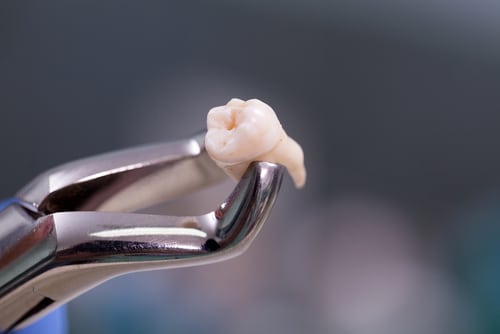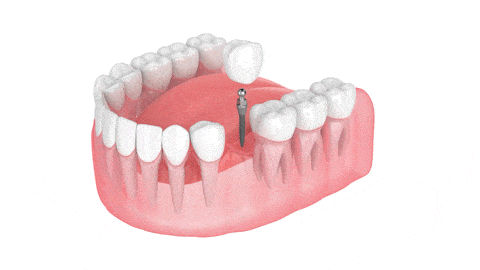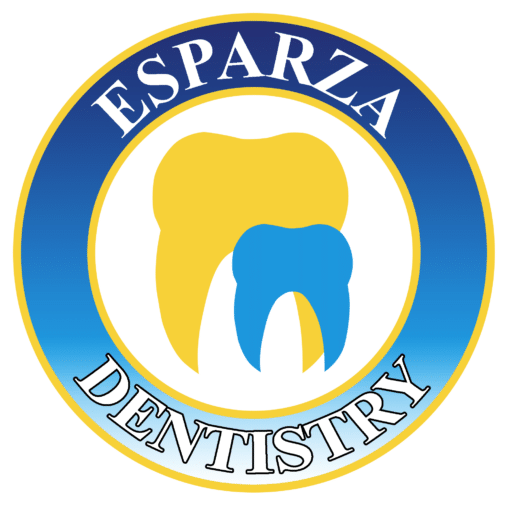Tooth Extractions in Ontario, CA
At Esparza Dentistry, we aim to preserve your natural teeth whenever we can. Unfortunately, there are times when a tooth is so damaged or decayed that it cannot be saved. In these cases, we perform tooth extractions to maintain your oral health by preventing further damage.
While severe decay and gum disease are the most common reasons for tooth extractions, we may recommend extraction for various concerns. Tooth extraction may be needed if:
- Your teeth are damaged or broken beyond repair.
- Your teeth are severely decayed and can’t be remedied with a filling, root canal, or crown.
- You have periodontal (gum) disease that has led to gum and bone tissue deterioration.
- Your teeth are too crowded. Some people need a tooth removed before orthodontic treatment to create space for teeth to align properly.
- Your wisdom teeth are causing issues like overcrowding or increasing your risk for infection.
Tooth Extractions: How Do They Work?
When a tooth is visible and easily accessible, we can perform a simple extraction. We’ll apply local anesthesia first to numb the area. The tooth is then gently loosened with a dental elevator and pulled from the socket with forceps.

A surgical extraction is needed for hard-to-reach teeth, such as impacted wisdom teeth. Because surgical extractions often call for additional anesthesia, you’ll need to arrange for someone to drive you home after your procedure. In cases of surgical extraction, we need to make an incision in the gum to access the tooth. Sometimes we need to create a gum tissue flap or trim down some bone tissue to make the tooth accessible. Depending on how deeply rooted the tooth is, we may need to remove it in pieces. Sectioning the tooth allows us to extract it without putting too much strain on it, reducing the likelihood of complications.
After removing the tooth, we will clean the socket and close the gum tissue with sutures. We’ll ask you to bite down on a gauze pad to stop the bleeding and encourage a blood clot to form in the socket.
Socket Preservation
Teeth stimulate the jawbone when you bite and chew, signaling to the jaw to generate new cells that keep your bone healthy. When a tooth is lost or extracted, the jawbone in that area is no longer stimulated, which means the bone will begin to recede. Unfortunately, when the bone deteriorates, the teeth can shift, leading to misalignment and complications if you plan to get a dental implant in the future. Without intervention, your jawbone begins to atrophy shortly after we extract the tooth.
Socket preservation is a bone grafting technique that delays the deterioration of the jawbone by transplanting bone tissue to the extraction site. Building up the bone tissue strengthens it for a future dental implant. While mini dental implants take up significantly less space in the jawbone than traditional implants, you still need sufficient jawbone volume and density to accommodate them. Socket preservation helps maintain the jawbone’s health until we place the mini dental implant.
How Long Do Tooth Extractions Take?
The length of a tooth extraction procedure depends on several variables, including:
- Type of extraction: simple or surgical
- Number of extractions needed
- Location and type of teeth needing removal
- Whether socket preservation is needed
- If a mini dental implant will be placed immediately
At your free consultation, we’ll discuss everything you can expect from your extraction, including the expected procedure length.
Recovery and Aftercare for Tooth Extractions
Proper recovery after tooth extractions depends on your commitment to aftercare guidelines. It is particularly important to protect the blood clot that forms in the socket after the tooth is extracted. In the first few hours after your surgery, you should continue to bite down on gauze to encourage the blood clot to form. The blood clot begins the healing process and protects your nerves and bone from bacteria that can cause an infection. However, some behaviors can cause the blood clot to dislodge, which may create a dry socket that exposes the bone. Dry sockets can be very painful. If you think that you have a dry socket after your extraction, be sure to call us.
While we will give you detailed post-surgery directions after your procedure, some general recommendations are as follows:
- Rest and relax: Avoid strenuous physical activity for a few days. Getting your heart pumping increases your blood flow which can disrupt the blood clot and create a dry socket. As with any surgery, taking time to rest will aid in your recovery. Once you heal, you can hit the gym again.
- Clean the extraction area: Keeping the extraction area clean and preventing infection is important after your procedure, but you must do so carefully. Don’t rinse your mouth until at least 12 hours after your procedure. After 24 hours, you can brush your teeth gently, but be cautious around the extraction site.
- Reduce swelling: To reduce swelling, apply an ice pack in 20-minute intervals during the first 24 hours after your surgery. Sleeping with your head elevated at a 45-degree angle will allow blood to flow away from the extraction site and reduce swelling.
- Manage pain: If we prescribe pain medications or antibiotics, be sure to take these exactly as directed. Over-the-counter pain relievers like ibuprofen can also help manage pain and swelling.
- Eat soft foods and don’t use a straw: We recommend sticking to a soft food diet and gradually introducing more solid foods as you recover. Foods like pudding, soup, Jell-O, eggs, and mashed potatoes will be easier to eat in the days immediately following your procedure. While it may be tempting to use a straw to eat or drink, doing so creates suction that can dislodge the blood clot.
- Don’t smoke or drink alcohol: Wait at least 3 days before smoking and 7-10 days before consuming alcohol, as both can prevent blood from clotting properly.
After a few days, you’ll be able to comfortably return to your normal activities.
Mini Dental Implants Replace Missing Teeth
You can smile confidently after your tooth extraction with a mini dental implant.
Mini dental implants are a pioneering replacement technology for lost or extracted teeth. The implant is a prosthetic tooth root made from a titanium post that is screwed into the jawbone. The top of the post sits above the gum line and connects to a dental appliance like an artificial crown, bridge, or denture.

With a mini dental implant, we can quickly fill the gap in your smile. Unlike traditional implants, which require prolonged healing periods before being placed, mini implants can often be placed immediately after a tooth is extracted. This is due to the significantly smaller size of the implant, its streamlined design, and the efficiency of the placement technique.
Esparza Dentistry is part of the Mini Dental Implant Centers of America, a prestigious group of the best implantologists in the country. As experienced implant dentists, we will help you achieve a beautiful and functional smile after your extraction.
Trust Esparza Dentistry to Remove and Replace Your Damaged Teeth
If you need to have a tooth removed, there’s no need to worry. At Esparza Dentistry, we treat our patients like they are family. Whether you or a loved one needs a tooth removed, you can trust us to perform professional tooth extractions and expert mini dental implant placement in a compassionate and family-friendly setting.
Contact us today to schedule a free tooth extraction consultation.
Related Videos
- What is a Dental Implant?
- What is a Mini Dental Implant?
- Mini Dental Implants vs. Conventional Implants?
- Are Mini Implants as Good as Regular Implants?
- Do You Offer Free Implant Consultations?
- The Mini Dental Implant Process
- How Long Do Mini Dental Implants Take To Heal?
- What If I Don’t Have Enough Bone for a Dental Implant?
- Will I Require Bone Grafting for a Mini Dental Implant?
- Bone Grafting Alternatives
- Am I Too Old for a Dental Implant?
- What If I’m Missing a Single Tooth?
- What If I’m Missing Multiple Teeth?
- How Long Do Mini Dental Implants Last?
- Are Mini Dental Implants Painful?
- Can I Get a New Tooth the Same Day as an Extraction?
- Can Mini Dental Implants Replace All of My Teeth?
- How Much Does a Mini Dental Implant Cost?
- Are Dental Implants Covered By Insurance?
- Financing for Dental Implants
- Financing for Mini Dental Implants
